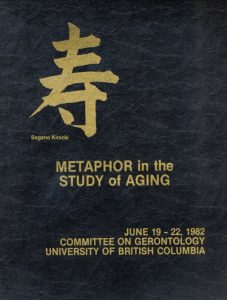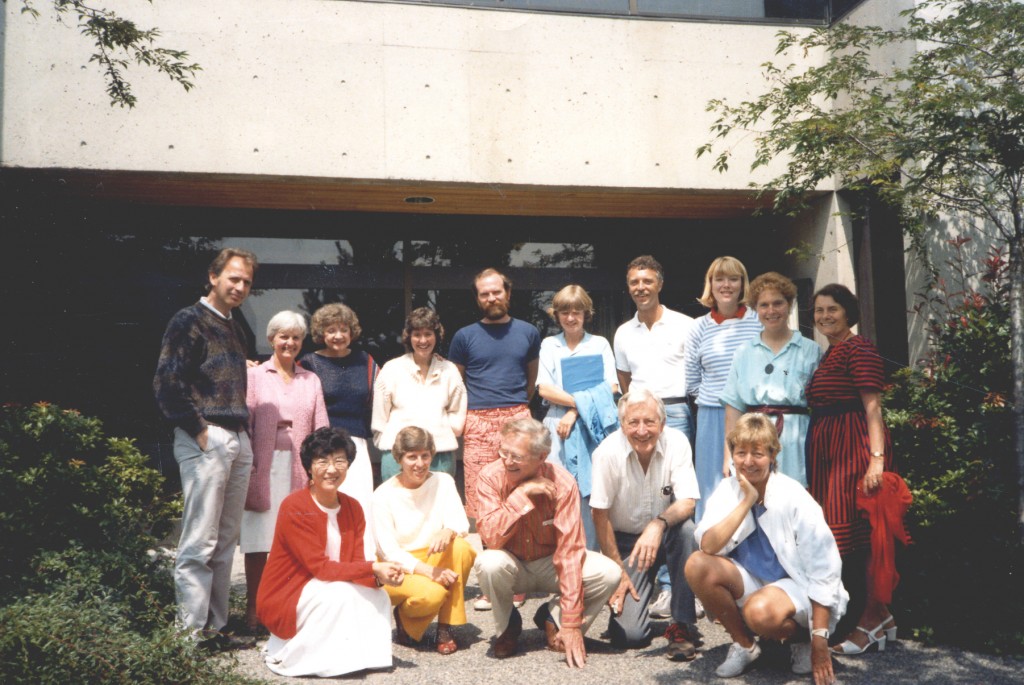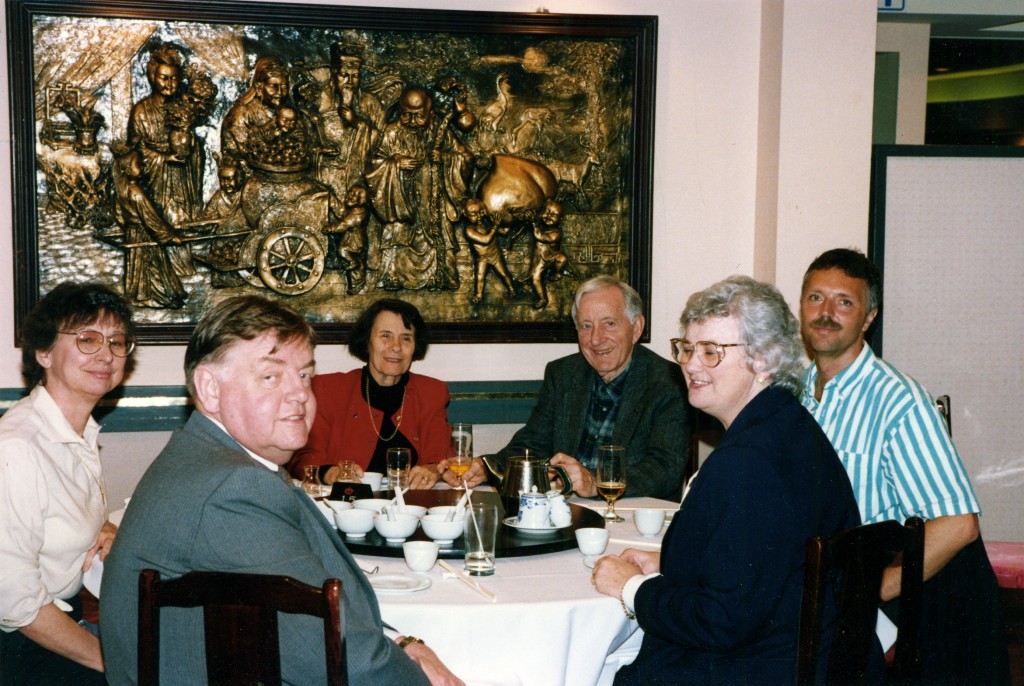REFLECTIONS: JAMES E. AND BETTY BIRREN at UBC
Events Shaping Gerontological Studies at UBC
My Legacy Story
James E. Thornton
Associate Professor Emeritus
Department of Educational Studies
University of British Columbia
2018
It is my hope that my thoughts, so briefly sketched here, will fully express my thanks to both Jim and Betty Birren for their many, enormously engaging experiences offered since our first meeting in 1979 at University of British Columbia. Jim and Betty Birren entered my life as a “team and partners” and as recipients of the 1979 Cecil and Ida Green Visiting Professorship, University of British Columbia. They returned to UBC during the 1980-90s for conferences and symposia; and Jim consulted with the Dean, Faculty of Graduate Studies, on the prospects for a Centre on Aging at UBC in 1989, which was never initiated. I visited Jim and Betty often prior to his retirement from the University of Southern California and his subsequent affiliation at University of California, Los Angeles, staying in “my bedroom” in their home in Pacific Palisades on most of my visits. They have been so influential in my understanding of living a full and productive life. We exchanged our thoughts on Jim’s views on “aging as a counter part of development”, on learning in later life as an essential factor in the development-aging processes that shape our lives, on my educational views of the essential nature of learning in adult development and aging, and we shared our experiences in guided autobiography groups – the landscape of reminiscence and life review.
“You can help older adults build greater understanding and self-worth by leading guided autobiography groups. From the viewpoint of human development, there is little of greater importance to each of us than gaining a perspective on our own life story, to find, clarify and deepen meaning in the accumulated experience of a lifetime. …. Particularly in the later years, a person needs to believe that his or her life has mattered, that it has had a purpose or an impact on the world. Guided autobiography enhances these feelings, promotes successful adaptation to old age, and assists positive choices by person at a crossroad in life. A grasp of the fabric of one’s life can make a significant contribution to well-being in later life. …. Guided autobiography is based on a number of concepts about how people develop understanding of themselves and their lives and how memory, personal reflection, and present perceptions interact. It evokes and guides reminiscence, that is, the recall of events from the past, and directs the individual to examine their memories from the perspective of the present. It is a form of semi structured life review, bringing review of events and emotions over the life course one step further—into a group context wherein different members’ perceptions and histories can evoke further reflection and challenge earlier views of the self.” (Birren & Deutchman, 1991, p 1).
Below, I have briefly sketched Jim and Betty Birren’s activities at the University of British Columbia that contributed to the emergence of educational programs of later life learning in the Department of Adult Education, Faculty of Education, and studies in gerontology in other UBC Faculties and departments. But first, I need to outline my initial activities at UBC that lead to these events.
1969-1978. I started teaching in the Department of Adult Education, Faculty of Education, University of British Columbia, at the age of 42, a two-year appointment as assistant professor working on my doctorate in adult education at the University of Michigan. I was surrounded by colleagues 15-20 years younger than me. The developing field of academic studies in adult education covered early adulthood to retirement. My educational interests and teaching began to focus on mid-life and older adults as learners – more were entering university programs and attending workshop and summer courses in continuing education on life-long learning. By 1976, my interests took shape – I was 49 years old, an “older learner” exploring the emerging literature of life-long learning and formal adult education courses about older adults as learner, the emerging field of andragogy. In 1977-78, I began to layout a graduate program in education and aging, a sequence of adult education courses and seminars leading to a Master’s Degree (MEd or MA) in Educational Gerontology, which was approved by Graduate Studies. To launch this new program, Dr. William Griffith, Department Head, Adult Education, suggested that I contact Dr. James E. Birren as a possible nominee for a Cecil and Ida Green Visiting Professorship.
1978-1979. I called Dr. Birren, Dean, Leonard Davis School of Gerontology, Ethel Percy Andrus Gerontology Center, University of Southern California, introduced myself and after a brief social chat outlining the department’s interests in education and gerontology, I asked: “If we submitted your name for the Cecil and Ida Green Visiting Professorship – would that be Okay, and would you accept and come to UBC?” Dr. Birren agreed with a provision that Betty Birren be included in the submission. Dr. James E. Birren and Mrs. Betty Birren Nomination was submitted for the Cecil and Ida Green Visiting Professorship, Summer 1979. It was awarded:
Cecil and Ida Green Visiting Professorship, University of British Columbia,
Lecture Series on Adult Development and Aging.As well, Dr. Robert Havighurst, Committee on Human Development, University of Chicago, was invited to offer a 1979 Summer Seminar for Educators in Gerontology: Developmental Tasks in Later Life. These events inaugurated the graduate program in educational gerontology that would evolve over the next 10 years into a series of seminars, public lectures, summer institutes and conferences. Betty Birren was an active collaborator with all of us. The Summer Institute and Summer Seminar were great events in launching the Educational Gerontology courses in Adult Education.
Several years later, I asked Jim Birren: “Why did it seem so easy then (1979) to get you nominated and for you to accept the Cecil and Ida Green Visiting Professorship?” Birren said that it wasn’t his first visit to UBC as in the mid-1960s he was a possible candidate for Dean, Department of Psychology. At the same time, he was considering an appointment at University of Southern California and the establishment of the Ethel Percy Andrus Gerontology Center. My thoughts when Jim said this, “How fortunate for the many disciplines and programs in the study of aging everywhere that you accepted USC.” At the time, UBC was unprepared for the cross-inter-disciplinary approaches and studies of gerontology (development and aging) that Jim nurtured at USC.
In the fall of 1979, I attended a Gerontology Society of America conference in San Diego and had an opportunity to renew my relationship with the Jim and Betty Birren. Over breakfast, Jim shared his thoughts on “metaphors of aging” to explore the essence and scope of aging. We discussed the possibilities for a symposium or conference on the topic. I jumped at the opportunity to develop this with him. At the time, I was a member of the UBC President’s Committee on Gerontology and thought this potential symposium was an ideal project for the committee and developing educational gerontology at UBC. In 1980, I was appointed as Chair, Graduate Committee on Gerontology, Faculty of Graduate Studies. This was the foundation for me to initiate with the guidance of Jim Birren the following symposium and events at UBC from 1982 to 1988.
 1982. Metaphors of Aging in the Social Sciences and Humanities: An International Symposium [Funded by SSHRC], University of BC. The Symposium
1982. Metaphors of Aging in the Social Sciences and Humanities: An International Symposium [Funded by SSHRC], University of BC. The Symposium
brought together over 50 scholars from North America, Europe, and Japan and was an outstanding success. Ideas from papers presented and explored at this Symposium are found in Metaphors of Aging in Science and the Humanities, edited by Gary M. Kenyon, James E. Birren, and Johannes J. F. Schroots. Springer, 1991.
1984. Ethics and Aging Symposium & Conference. Papers presented at this Symposium were published: Ethics and Aging: The Right to Live, the Right to Die, edited by James E. Thornton and Earl Winkler, University of British Columbia Press, 1988. In the Symposium, Jim Birren’s and Candace Stacey’s paper Paradigms of Aging: Growth versus Decline provide this final thought: “The thesis of this paper is that our aging is a product of many complex forces. Our wisdom and meta-strategies can be brought to bear directly on the issue of how we want to grow old. Only through the examination of our scientific metaphors and through interdisciplinary exchange between humanists and scientists can theory in aging progress. Only through these can our ethical behavior in caring for the dependent elderly and caring about the circumstances of their death develop (p. 69).” For me this became an essential element in the foundation and scope of educational gerontology.
1984-85. Education and Aging, Seminars at Andrew Norman Institute for Advanced Studies in Gerontology and Geriatrics, Andrus Gerontology Center, University of Southern California. The seminars resulted in the book Education and Aging, edited by David A. Peterson, James E. Thornton and James E. Birren, Prentice Hall, 1986. The Education and Aging Symposium and published papers are included as it was vital to the continuing development of the Educational Gerontology graduate studies in Adult Education at UBC and the founding of the Educational Gerontology Division, Canadian Association of Gerontology in 1990.
1986. Summer Institute in Gerontology: Guided Autobiography, Seminar course with Jim and Betty Birren. This Seminar was shaped by methods and themes being developed since 1975 by Jim Birren that would be outlined and published in the J. E. Birren & D. E. Deutchman book Guiding Autobiography Groups for Older Adults: Exploring the Fabric of Life, The John Hopkins University Press 1991.

Guided Autobiography Workshop and Seminar – July 1986
Jim Birren second from the right (kneeling) and Betty Birren on the right (standing)
Others, but not in order: Donna Hoopfer, Jane Dawson, Jean Marie Lehtinen, Brenda Dafoe, Wilhelm Mader, Beverly Burnside, Randy Nussli, Brian de Vries, Nita Ditchfield, Young Sook Joo, Dick Seaton, Mary Dupuis, Margaret Fraser,
Photographer Jim Thornton
Brian de Vries attended this Seminar and completed his UBC doctoral degree in 1988 and, subsequently, post-doctoral studies with Jim Birren at the University of California, Los Angeles, in 1989. After completing his post-doctoral work at the University of Southern California, Brian returned to UBC for an appointment in the School of Family Studies. Brian and Jim Birren published the paper: Adult Development Through Guided Autobiography: The Family Context, Family Relations. Interdisciplinary Journals of Applied Family Studies, 39, January 1990 (pp 3-7).
A second book was published: J. E. Birren & K. N. Cochran, Telling the Stories of Life through Guided Autobiography Groups, The John Hopkins University Press, 2001. This book provides methods and themes for workshop group activities, which I pursued into my retirement years.
1988. I had several consultations with the Dean, Faculty of Graduate Studies, and meetings with members of the Graduate Committee on Gerontology, which I chaired, about possibilities and potentials for a centre for gerontology studies and interdisciplinary programs of aging and gerontology at UBC. At that time, I was unaware of the Dean’s meetings with Jim Birren or of Jim’s comments submitted to the Dean in 1984, until Jim sent me a copy of his report in 2004. The possibilities of major initiatives for interdisciplinary gerontological studies and a Centre for Gerontology or Studies of Aging were largely minimal and not realized at the time, but that is another story for another time.
1988-89. Inaugurating the Educational Gerontology Interest Group, Canadian Association on Aging (CAG). This initiative began in the CAG annual conferences during early 1980s as several members were submitting papers on education and aging, and educational gerontology was established in the United States and being explored in England. I helped form the interest group of about 30 in 1984. In early 1989, as head of that group, I submitted James E. Birren’s nomination for a CAG Award in 1989 for his contributions to gerontology in Canada. Jim’s Certificate Award details the contributions he has made to the study of aging in Canada, and his involvement at many Canadian universities in the 1970s and 1980s. The award was presented at the 1989 CAG meeting in Victoria BC. With the Educational Gerontology Interest Group, I organized a luncheon at which Jim was featured speaker. Over 200 people attended. The Division of Educational Gerontology in the Canadian Association of Gerontology was formally established in 1992.
1989 – 1990 Brian de Vries, after completing his doctoral degree pursued post-doctoral studies at the University of Southern California with Jim Birren. During Brian’s studies the following article was prepared: Adult Development Through Guided Autobiography: The Family Context, Brian de Vries, James E. Birren & Donna E. Deutchman: Family Relations Vol 39, No 1 (January 1990). Brien returned to UBC with an appointment in the Dept. of Family Studies.

Pink Pearl Restaurant, Vancouver, 1989
Betty and Jim Birren (back)
(Left to Right) Dr. Susan Butt, Psychology; Dr. Donald MacDougall, Law; Dr. Lynn Beattie, Geriatric Medicine; Dr. Brian De Vries, School of Family
Photographer, Jim Thornton
1992 – Jim and Betty Birren came to UBC for a Summer Institute with the School of Family and Nutritional Sciences, collaborating on a summer course with Brian de Vries. Brian had this to say about Jim and Betty’s visit: “Jim and Betty came to Vancouver during this summer for two weeks to teach a course on Aging and the Family through the School of Family and Nutritional Sciences. They stayed at my condo (on Pacific Street) for the two weeks they were there. And, their grandson John was with them for at least part (and perhaps all) of their stay. We spent a weekend on Pender Island during that time. I recall that Jim was to have his working permit papers stamped while crossing the border; they failed to do so and so he had to return to the border by car to have them signed. I recall him saying that he walked across the border to the US to come through the border again with his papers so that they could be signed, and he could be compensated for his teaching.”
1993-2003. I retired in January 1993 and relocated in Vernon, BC, and focused on a new home and property to develop, helped organize the Vernon Bonsai Club, remained active in the Canadian Association of Gerontology initiatives and taught summer courses in Educational Gerontology (ADED 525) at UBC in 1993 and 1994. During these initial years of retirement, I also visited Jim and Betty, attending events at USC and later at UCLA, and stayed in “my bedroom” in their home in the Pacific Palisades on most of these visits. In home chats, we had extensive reflections on emerging studies and themes for ‘use it or lose it’ and ‘learning for later life’.
2003. I attended The Gerontology Society of America, Guided Autobiography Symposium, San Diego, in November. This symposium organized by Jim Birren, Cheryl Svensson and colleagues provided the opportunity for me to begin a series of workshops (2003-2010) and several published articles with John B. Collins on guided autobiography as a learning experience. Subsequently, a Canadian Council on Learning research study was initiated as Community-Based Qualitative Research Study: Adult Learning and Meaning- Making in Guided Autobiography Developmental Exchanges (available on www.guidedautobiography.ca).
2004. The ASA-Osher Institute sponsored Jim Birren and Cheryl Svensson in the Guided Autobiography Workshop for the Senior’s Learning in Retirement Program, Okanagan Community College, Kelowna BC, in 2004; and Jim’s public lecture: Gerontology – Past, Present and Future – The Agequake.
These events helped launch my first community-based workshops beginning in 2003, 2004 and 2005 in Vernon and Kelowna BC; expanding my social events by offering workshops when I travelled to Ajijic, Mexico in 2005, 2007 and a reunion group in 2009; a workshop series with The Centre on Aging, University of Victoria, BC in 2007, 2008, 2009; a workshop series in my residential area of Cobble Hill, BC, 2007, 2009; and, most recently, a Wisdom Exchange Workshop in 2015, 2016 based of GAB workshops methods sponsored by the Hillside Wellness Centre and Greater Victoria Elder Care Foundation, Victoria, BC.
During all the early activities from 2003 to 2009, I began to review and organize my own life-story in a series of story-board outlines and written vignettes I had shared with workshop participants. I was a teacher-facilitator – I was also a participant. Subsequently, beginning in 2008, I worked on my own life stories as I transcribed and recorded my grandparents’ letters of 1883-84. In 2012, I wrote my autobiography which provides many of my reflections and thoughts of family and life events; and, in 2014, a family memoir of my descendants – my mother’s family, the Wengers, Wileys, and my father’s family, the Thorntons and Bells. These documents have been self-published and passed on to my family, relatives and several community social societies and historic libraries and archives in Ohio and Michigan.
Now, as I reflect on events with Jim and Betty Birren over the past 35+ years, I realize they were more than friends. They were significant mentors and my extended family. And I am not the only person who has experienced and cherished their lives. They made enormous contributions to many individuals, programs and institutions worldwide in the academic studies of aging, mentoring students and colleagues in educational programs of numerous disciplines, guiding collaborators in research and published papers, and nurturing organizations regionally, nationally, and internationally. They were open, candid, understanding participants in all that they did and offered their skills and insights to those ‘exploring the fabric of their lives’. Jim and Betty Birren never wavered in their unique abilities to guide, inspire and listen, or in their willingness to explore and share. They were consummate mentors, collaborators, and professionals, and dear friends to us all.
When I first sketched my career path at 75, and then at 83 re-viewing events, I explored my autobiographical memory while writing my autobiography, much of which I shared in my workshops, I was largely trying to be helpful, supportive, and involved. For my own well-being, I hoped to carry forward my sense of collaboration with participants and friends as we all strove for understanding our life transitions and learning methods to enhance our transformative experiences. Now, at 90, in writing this sketch, reminiscing and reviewing life events, I find there are no significant changes I would make to these reflections. But, other thoughts are coming to mind, particularly those that suggest transcendence, a sense of wholeness and moving beyond. During these almost five decades, I have enjoyed discussing and working on issues and projects with others about developmental learning as we age and sharing with others our stories of what was learned, the knowledge acquired, and the wisdom expressed and shared. Carl Rogers, a prominent psychologist, and author of the book Freedom to Learn (CE Merrill, 1969) also shaped and framed my philosophical approaches to learning and teaching to this day. I believe that over our life course we should learn to be free and open, to share goals and aspirations, and to enhance our skills imaginatively – ultimately, we are responsible for what we want, what we do, and what we need to learn to fulfill, balance, and enrich our life portfolio as we enhance and share our life review.
REFERENCE & NOTES: This sketch was extracted from these documents:
Birren, J. E. & Cochran, K. N. (2001). Telling the Stories of Life Through Guided Autobiography Groups. The John Hopkins University Press.
Birren, J. E. & Deutchman, D. E. (1991). Guiding Autobiography Groups for Older Adults: Exploring the Fabric of Life. The John Hopkins University Press.
de Vries, B., Birren, J. E. & Deutchman, D. E. (January 1990). Adult Development Guided Autobiography: The Family Context. Family Relations, Interdisciplinary Journal of Applied Family Studies, 39, pp 3-7
de Vries, B., Birren, J. E. & Deutchman, D. E. (1995). Method and Uses of the Guided Autobiography. In Barbara K. Haight and Jeffrey Webster (Eds.), The Art and Science of Reminiscing. Taylor & Francis Publishers.
de Vries, B. & Thornton, J. E. (2018). Research on Guided Autobiography: A Review of Content, Process and Outcome. International Institute of Reminiscence and Life Review.
Peterson, D., Thornton, J. E. & Birren, J. E. (Eds.) (1987). Education and Aging. Prentice Hall
Thornton, J. E. (2008). The Guided Autobiography Method: A Learning Experience. The International Journal of Aging and Human Development, Vol. 66, No. 2.
Thornton, J. E. (February2012) My autobiography: Telling My Life Story – a journey of discovery . . . (self-published)
Thornton, J. E. (unpublished paper). Remembering James E. Birren and Betty Birren submitted February 2, 2016, to Phoebe Leibig, Un. of Southern California, and to Cheryl Svensson, Birren Center for Autobiographical Studies, celebrating Jim’s and Betty’s legacy.
Thornton, J. E. (2018). Reflections on James E. and Betty Birren: Events Shaping Gerontological Studies at the University of British Columbia and My Life Review.
Thornton, J. E. & Collins, J. B. (2010). Adult Learning and Meaning-making in Community- based Guided Autobiography Workshops. Canadian Council on Learning.
Thornton, J. E. & Winkler, E. R. (1988). Ethics and Aging: The Right to Live, The Right to Die. University of British Columbia Press.

>>RETURN TO “TELLING OUR STORIES” MENU<<